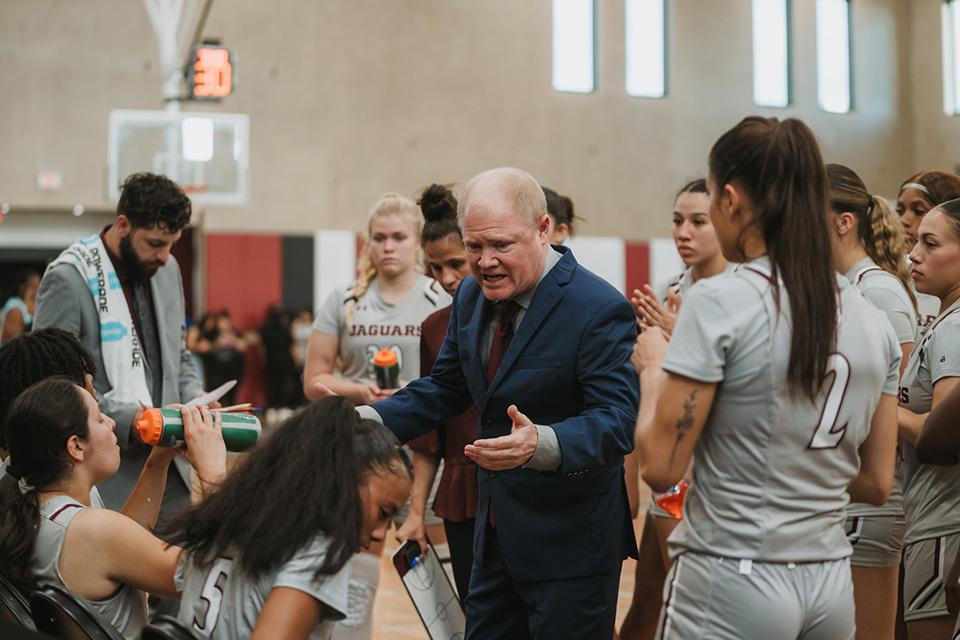When Chris Minner started as the inaugural women’s head basketball coach at Texas A&M University–San Antonio in January 2024, he was tasked with building a program from the ground up. In his first season, Minner and his Jaguars proved they belonged, posting an 18–12 overall record and reaching the Red River Athletic Conference semifinals.
What many don’t know is that while Minner was drawing up plays and recruiting players, he was also busy pursuing a Ph.D. in leadership studies at the University of the Cumberlands, in Williamsburg, Kentucky.
“I just finished year three. It’s a four-year program, all online,” Minner said. “I should be defending my dissertation in May.”
For Minner, the decision to pursue a doctorate wasn’t just about personal achievement—it was about preparation, perspective, and setting an example.
Minner’s academic résumé already spans three degrees: a bachelor’s in kinesiology from Sonoma State University, a master’s in health, physical education, and recreation from Saint Mary’s College of California, and an MBA with a management focus from Our Lady of the Lake University in San Antonio.
 Even with those credentials, Minner noticed how much doors could open—or close—based on education. “I never wanted to apply for a job and not get it because of a piece of paper,” he said. “When you mention Ph.D., people’s body language changes. It’s interesting.”
Even with those credentials, Minner noticed how much doors could open—or close—based on education. “I never wanted to apply for a job and not get it because of a piece of paper,” he said. “When you mention Ph.D., people’s body language changes. It’s interesting.”
The Ph.D. program, with an emphasis on student personnel management, deepened his knowledge of higher education. At Midway University, where he previously coached, Minner taught orientation and sports management leadership classes. That experience sparked an interest in the academic side of college life.
“I learned a lot about higher ed administration, enrollment management, and accreditation,” he said. “Now, when I sit in meetings with marketing or financial aid, I can see why they do certain things. It makes me a better colleague—and a better coach.”
Minner’s coaching career spans more than two decades and nearly every level of the sport: NCAA Division I and II, NAIA, and junior college. He’s been a head coach at Texas A&M–Texarkana, Midway University, and Our Lady of the Lake, where he guided teams to historic runs and national tournament appearances.
“I always wanted to coach, and I knew education was part of that journey,” he said.
That belief—that education distinguishes coaches in a competitive field—has carried him through. “What’s going to separate you from other people? It could be your academic qualifications,” Minner said. “If a college needed me to step in as a full-time instructor tomorrow, I could do that.”
Beyond the practicalities, Minner says the Ph.D. program has shaped how he leads on and off the court.
“I’ve learned a lot about leadership styles and their effects,” he explained. “In meetings now, I can identify different dynamics—what’s effective and what’s not. It’s made me better in those situations, and it’s helped me with my team.”
The coursework has also given him new tools for teaching athletes about accountability, preparation, and resilience. “It’s good for our student-athletes to see that their coach is still learning, still working,” Minner said. “I want them to know we’re not just here for athletics. We’re here for academics, too.”
As his May graduation approaches, Minner acknowledges that the degree opens new doors—possibly even a future in higher education administration.
“I love coaching. It’s what I do. I can’t see myself not coaching,” he said. “But I also know I could step into administration tomorrow if I had to.”
For Minner, the journey has been as important as the destination. The long hours of reading, writing, and research have not only prepared him academically but also affirmed his belief in the value of education.
“I don’t know if I’m any smarter,” he joked. “But I do know it’s made me better at my job. And I think it’s a good thing for our community and our players to see their coach taking this seriously. At the end of the day, I want to win games. But I also want to set an example. If I expect our players to be student-athletes, I should be one too.”